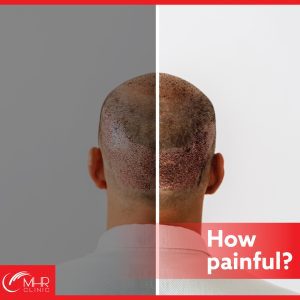
When it comes to addressing hair loss, hair transplants have emerged as a popular solution. However, one question frequently lingers in the minds of potential candidates: Are hair transplants painful? Join us as we unravel the truth behind this common concern and shed light on the revolutionary comfort offered by state-of-the-art hair transplant companies, such as MHR Clinic.
Reduced Discomfort Through Modern Approaches:
The realm of hair transplantation has been transformed by remarkable advancements in medical technology. Where traditional approaches once brought about substantial discomfort, contemporary methods like Follicular Unit Extraction (FUE) and Follicular Unit Transplantation (FUT) have markedly alleviated the sensation of pain. FUE focuses on the extraction of individual hair follicles, whereas FUT entails removing a tissue strip containing hair follicles from the donor region. These approaches feature enhanced anaesthesia administration and surgical precision, culminating in a notably enhanced comfort level for patients.
Anaesthesia and Local Aesthetics:
One of the main reasons for the reduced pain during hair transplants is the administration of anaesthesia. Hair transplant companies, cut as MHR Clinic, use local aesthetic to numb the scalp, ensuring that the patient doesn’t feel any pain during the procedure. Surgeons also employ techniques to minimise discomfort during and after the surgery, making the process much more tolerable.
After Surgery Discomfort:
Following the procedure, the degree of discomfort varies among individuals, with the majority of patients describing only slight discomfort. A few individuals might encounter gentle soreness, a sense of tightness, or a sensation akin to mild sunburn, typically fading within a few days. To help patients swiftly return to their usual routines, doctors frequently provide pain medication to address any discomfort during the initial recovery phase.
Personal Pain Threshold:
It’s important to acknowledge that individual pain tolerance can greatly influence the perception of discomfort during a hair transplant. What might be uncomfortable for one person, might be relatively painless for another. Factors such as anxiety, stress, and overall health can also play a role in how a person experiences pain during and after the procedure.
Communication with the Surgeon:
Clear communication with your hair transplant surgeon is key. Prior to the procedure, discuss your concerns about pain and discomfort. Your surgeon can provide detailed information about the techniques they’ll use, the anaesthesia process, and what to expect during the recovery phase. Having a comprehensive understanding of the procedure can help alleviate unnecessary anxiety.
In conclusion, the notion that hair transplants are painfully agonising is largely a misconception. Thanks to modern techniques, local anaesthesia, and improved post-operative care, such as that offered by MHR Clinic, the discomfort associated with hair transplants has been significantly reduced. While some mild soreness and tightness may be experienced during recovery, most patients find the overall procedure surprisingly manageable. If you’re considering a hair transplant, ensure you consult with a reputable surgeon, openly discuss your concerns, and rest assured that the potential benefits far outweigh any temporary discomfort.
